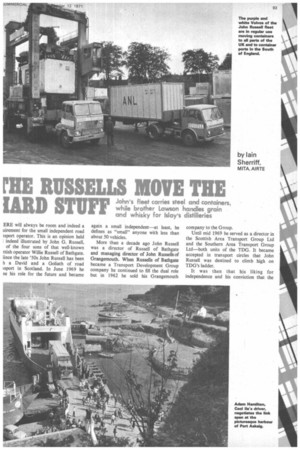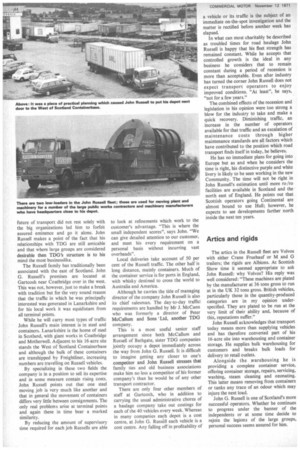LIE RUSSELLS MOVE THE IARD STUFF J w o i l i i i r l i e 'sfIecartc a ies st n ee i l ia a n n d d iesra containers, and whisky brother Islay's distilleries
Page 95

Page 96

If you've noticed an error in this article please click here to report it so we can fix it.
ERE will always be room and indeed a uirement for the small independent road Isport operator. This is an opinion held I indeed illustrated by John G. Russell,
of the four sons of that well-known lush operator Willie Russell of Bathgate. ;ince the late '50s John Russell has been h a David and a Goliath of road sport in Scotland. In June 1969 he se his role for the future and became
again a small independent—at least, he defines as "small" anyone with less than about 50 vehicles.
More than a decade ago John Russell was a director of Russell of Bathgate and managing director of John RusselLs of Grangemouth. When Russells of Bathgate became a Transport Development Group company he continued to fill the dual role but in 1962 he sold his Grangemouth company to the Group.
Until mid 1969 he served as a director in the Scottish Area Transport Group Ltd and the Southern Area Transport Group Ltd—both units of the TDG. It became accepted in transport circles that John Russell was destined to climb high on TDG's ladder.
It was then that his liking for independence and his conviction that the future of transport did not rest solely with the big organizations led him to forfeit assured eminence and go it alone. John Russell makes a point of the fact that his relationships with TDG are still amicable and that where large groups are considered desirable then TDG's structure is to his mind the most businesslike.
The Russell family has traditionally been associated with the east of Scotland. John G. Russell's premises are located at Gartcosh near Coatbridge over in the west. This was not, however, just to make a break with tradition but for the very sound reason that the traffic in which he was principally interested was generated in Lanarkshire and for his local work it was equidistant from all terminal points.
While he will carry most types of traffic John Russell's main interest is in steel and containers. Lanarkshire is the home of steel in Scotland, with giant works in Coatbridge and Motherwell. Adjacent to his 16-acre site stands the West of Scotland Containerbase and although the bulk of these containers are transhipped by Freightliner, increasing numbers are travelling on Russell vehicles.
By specializing in these two fields the company is in a position to sell its expertise and in some measure contain rising costs. John Russell points out that one steel moving job is very much like another and that in general the movement of containers differs very little between consignments. The only real problems arise at terminal points and again these in time bear a marked similarity.
By reducing the amount of supervisory time required for each job Russells are able to look at refinements which work to the customer's advantage. "This is where the small independent scores", says John. "We can give detailed attention to our customer, and meet his every requirement on a personal basis without incurring vast overheads".
Local deliveries take account of 50 per cent of the Russell traffic. The other half is long distance, mainly containers. Much of the container service is for ports in England, with whisky destined to cross the world to Australia and America.
Although he carries the title of managing director of the company John Russell is also its chief salesman. The day-to-day traffic requirements are handled by Mr J. McCann who was formerly a director of Peter McCallum and Sons 'Ltd, another TDG company.
This is a most useful senior staff arrangement since both McCallum and Russell of Bathgate, sister TDG companies jointly occupy a depot immediately across the way from John G. Russell. It is difficult to imagine getting any closer to one's competitor and John Russell stresses that family ties and old business associations make him no less a competitor of his formcr company's than he would be of any other transport contractor.
There are only four other members of staff at Gartcosh, who in addition to carrying the usual administrative chores of a haulage company take out costings for each of the 40 vehicles every week. Whereas in many companies each depot is a cost centre, at John G. Russell each vehicle is a cost centre. Any falling off in profitability of a vehicle or its traffic is the subject of an immediate on-the-spot investigation and the matter is rectified before another week has elapsed.
In what can most charitably be described as troubled times for road haulage John Russell is happy that his fleet strength has remained constant. While he accepts that controlled growth is the ideal in any business he considers that to remain constant during a period of recession is more than acceptable. Even after industry has turned the corner John Russell does not expect transport operators to enjoy improved conditions. "At least", he says, "not for a few years."
The combined effects of the recession and legislation in his opinion were too strong a blow for the industry to take and make a quick recovery. Diminishing traffic, an increase in the number of operators available for that traffic and an escalation of maintenance costs through higher maintenance standards are all factors which have contributed to the position which road transport finds itself in today, he believes.
He has no immediate plans for going into Europe but as and when he considers the time is right, his distinctive purple and white livery is likely to be seen working in the new Community. The time will not be right in John Russell's estimation until more ro /ro facilities are available in Scotland and the north east of England. He points out that Scottish operators going Continental are almost bound to use Hull; however, he expects to see developments farther north inside the next ten years.
Artics and rigids
The attics in the Russell fleet are Volvos with either Crane Fruehauf or M and G trailers; the rigids are Albions. At Scottish Show time it seemed appropriate to ask John Russell: why Volvos? His reply was well considered: "These machines are plated by the manufacturer at 36 tons gross to run at in the UK 32 tons gross. British vehicles, particularly those in the quantity-produced categories are in my opinion underspecified. They are plated to be run at the very limit of their ability and, because of this, reputations suffer."
John Russell acknowledges that transport today means more than supplying vehicles and has therefore converted part of his 16-acre site into warehousing and container storage. He supplies bulk warehousing for customers and breaks bulk loads for delivery to retail outlets.
Alongside the warehousing he is providing a complete container service, offering container storage, repairs, servicing, washing, steam cleaning and ozonating. This latter means removing from containers or tanks any trace of an odour which may injure the next load.
John G. Russell is one of Scotland's more successful operators. Whether he continues to progress under the banner of the independents or at some time decide to rejoin the legions of the large groups, personal success seems assured for him.










































































































































































































